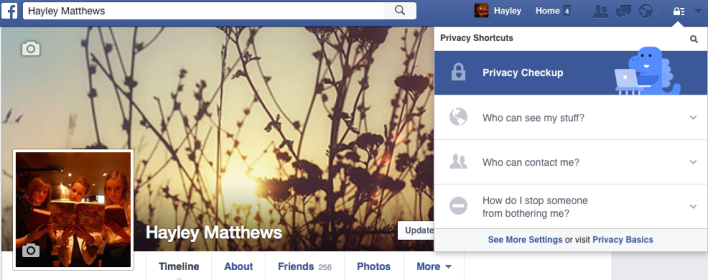Topic 2: The Intrinsic Link Between Identity and Privacy
Whilst on the Web today, it is very likely that at least one of the websites you visit will ask you to register. This allows web-based businesses to index personal information and over time add to it in order to build an online profile (Internet Society, 2015). Though this sounds very intrusive: having personal information collected and stored without your knowing, it can benefit you. It provides a personalised experience, offers product recommendations and helps to prevent fraud. However, understandably having any form of online identity results is speculation over privacy and security.
Maintaining one online identity is relatively easy, it simply reflects who I say I am. However, it is often argued that having multiple online identities allows for anonymity and creativity (Krotoski, 2012). These identities tend to be split into private and public, as this allows you to present yourself differently depending on your audience. For example, a recent survey by Acas found that 45% of employees today are screened through social media (Landau, 2013). In this case, having a public identity to present yourself to employers and a private identity for you friends, could help you retain your reputation.
Zuckerberg claims that Facebook is “built on real relationships, with real people, in real life” (Jarvis, 2011).
This is somewhat true in my case, as all my personal information is accurate and I know everyone I’m friends with. However, up until recently I hadn’t updated my Facebook identity since I created it, my details were minimal and out of date. Does this mean that its not entirely based on reality? What if I am involuntarily tagged in things or someone invites me to something – this suggests that other people can affect my identity.
Often individuals who lack confidence and self-esteem will create identities based on their ‘real’ self and their ‘ideal’ self (Jarvis, 2011). These individuals are more aware of the possible social and cultural judgements that may follow, depending on the characteristics they disclose (Costa and Torres, 2011). However, in creating multiple identities do we lack integrity? Conceivably, developing multiple personae encourages an irresponsible environment, in which cyber bullying can take place as a faceless crime. With this in mind, how much can we trust others online, if we ourselves aren’t being honest? Once again this comes back to the intrinsic link between privacy and identity.
References:
Costa, C. and Torres, R. (2011) To Be or Not To Be? The Importance of Digital Identity in the Networked Society, University of Salford, UK.
Internet Society (2015) Privacy and Identity, Accessed: February 2015.
Jarvis, J. (2011) One Identity or More? Accessed: February 2015.
Krotoski, A. (2012) Online Identity: Is Authenticity or Anonymity More Important? The Guardian, Accessed: February 2015.
Landau, P. (2013) Job Applications: Social Media Profiles Under Scrutiny, Accessed: February 2015.

